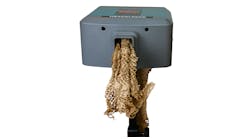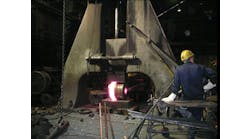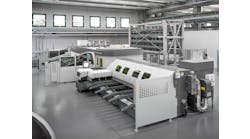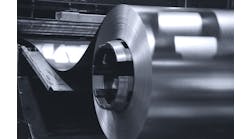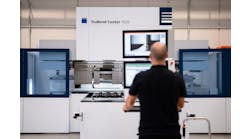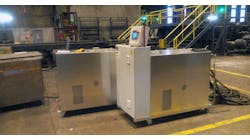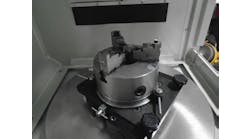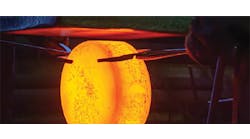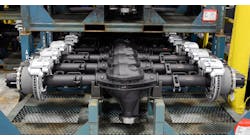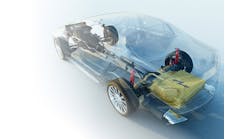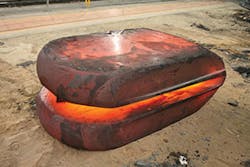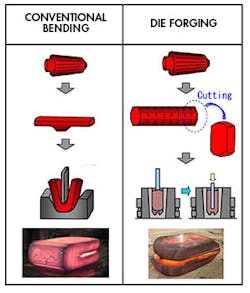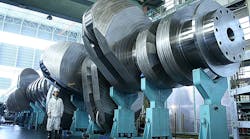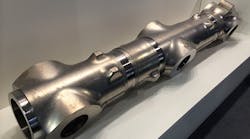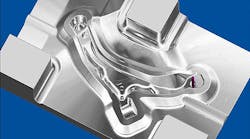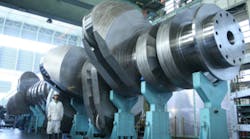Kobe Steel Ltd. is a forger like none other: its methods are heavily researched and its products are highly engineered, filling an indispensible role in the much broader definition of the industrial group. Its forgings may be found in automobiles and trucks, commercial aircraft and power plants.
And sailing the high seas. Several years ago Kobe Steel Ltd. developed a novel forging technique for manufacturing large-dimension crankshafts used in diesel marine engines.
Kobe Steel is one of the world’s largest manufacturers of crankshafts, but it developed a new die-forging method (first announced in 2013) specifically for near-net-shape crank throws for marine engines. The ultra-large “throws” exhibit considerable improvements in fatigue strength compared to those produced by the more standard roll forging method.
Specifically, the new development takes its direction from emerging, “eco-ship” designs for large ocean vessels, which are meant to operate with greater fuel efficiency in order to conserve energy and save operating costs, and to meet stricter environmental regulations.
Crankshafts convert the reciprocating motion of engine pistons to rotating motion of the shaft to transmit power that turns a ship’s propeller. Crankshafts can be produced by casting (ductile iron) or machining (specialty steel), but roll forging steel billets has emerged as a preferred method for many large engine manufacturers because the finished products are comparatively lighter and the process offers good dimensional control.
A crankshaft consists of a shaft (also called the “journal”) and the throws. The “throws” are the offset extensions to the shaft, to which the engine connecting rods attach. Larger crankshafts, and thus larger, stronger throws, are increasingly important in powering ocean-going cargo ships and tankers.
Larger diesel engines are being adopted to improve fuel consumption and lower exhaust gas emissions, along with large propellers that rotate at slower speeds. It follows that larger crankshaft are needed to link the engine pistons to the propeller.
Using die forging to produce “ultra large” crank throws allows Kobe Steel to achieve cylinder diameters of 80 cm or more on the shafts, with a fatigue strength that is 20% greater than that of conventionally forged shafts.
In 2014, Nippon Kaiji Kyokai (the Japanese ship classification society, known as ClassNK) qualified the forged steel products as a “special approved material” for marine diesel engine design, and in 2015 it was adopted by the International Association of Classification Societies (IACS) under Unified Requirements (UR).
Fully Certified
Last fall Kobe Steel Ltd. got another boost when ClassNK authorized the process with a factor of 1.05 for calculating the design fatigue strength of crank throws. Having already received the same ClassNK approval for small and medium-sized throws, Kobe Steel is the only company in the world to receive certification for the full range of throws, ranging from small to large, for use with two-cycle engines.
Kobe Steel continues to research and has other products and processes in the pipeline to serve the large crankshaft market. These may tap various other, non-forging capabilities of the industrial group, including stronger and cleaner steel grades for the crank throws, journals, and shafts, as well as high-strength materials for the rudder parts.
Kobe Steel plans to use its production technology for “super clean” steel to attain certification for higher K-factors (i.e., the method for determining relative strength of steel thickness.)
In addition, to achieve further weight savings in built-up crankshafts, it is necessary to ensure the gripping strength (slip resistance property) of the throw and journal. Kobe Steel has developed a cost-effective, low-alloy steel with a high yield point, and drafted new concepts for lightweight crank throws for current engines. The hope is that, in the future, these metallurgical and design developments will contribute to higher output and more compact engines that exhibit high fatigue strength.
Another development that may add to the efficiency of marine diesel engines will be better designs for rudders, such as a rudder horn that does not need to be welded to the hull. To prevent defects during welding, high-strength material generally requires heat treatment (preheating and post-heating) during welding.
Kobe Steel reports that a new cast steel material it has developed for rudder horns show no defects during welding, even though no heat treatment is applied. This development improves shipbuilding productivity, and makes possible higher-strength rudder parts.
The progress Kobe Steel has made in its initiative to optimize marine diesel engine performance is proof of the continuing necessity of engineering expertise, in forging, metallurgy, and any number of other critical processes.
